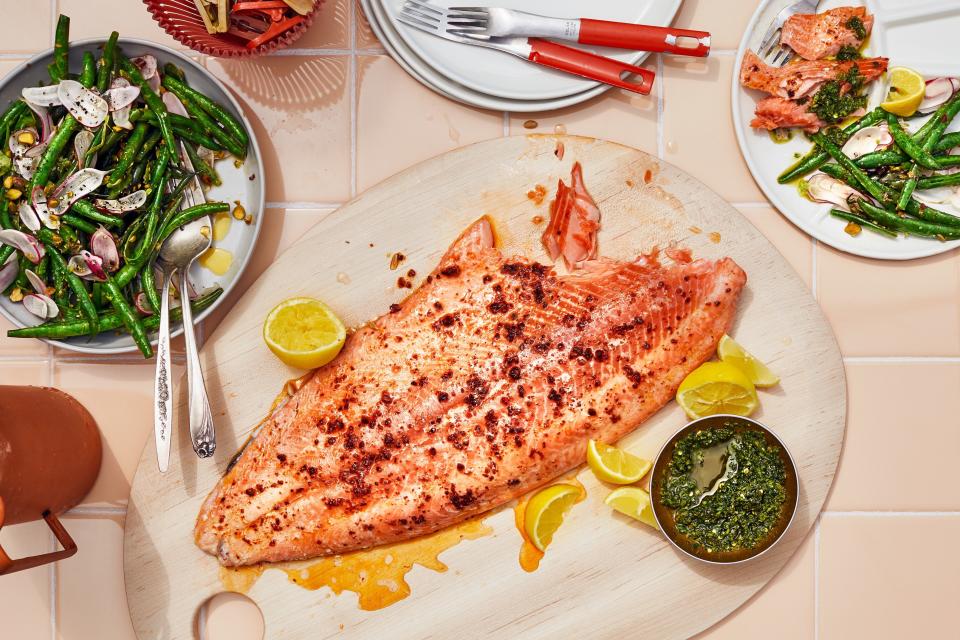Can You Freeze Cooked Salmon?

A recent thread on our Small Plates Facebook group posed the question: "can you freeze cooked salmon and then reheat it?" And the honest answer is that while you can, the question remains: should you?
A true story of obsession.
To find out if reheated cooked salmon could be just as good as freshly cooked salmon, assistant food editor (and Test Kitchen wiz) Kat Boytsova slow-roasted three salmon fillets and served them to me in a blind tasting. The first fillet had been cooked the day before, was frozen overnight, and then went straight from the freezer to an oven heated to 325°F, where it reheated for about 40 minutes in a foil-covered baking dish.
The second fillet had been cooked the day before, was frozen overnight, and then was thawed for six hours before reheating for about 10 minutes in 325°F oven; and the third fillet was cooked just before being served.
All three versions were plated identically, but just by looking I could tell the way in which each piece of fish had been prepared. The freshly cooked salmon was beautifully pink, moist, and plump. The piece that had been thawed and reheated was a bit paler and the flaky fish looked ever so slightly more compact. The final piece—the one that was reheated from frozen—was practically ashen. It had taken on a grayish hue and I could tell that Kat had attempted to wipe away the albumen (that white, viscous liquid that oozes from the pores of overcooking fish).
The flavor of each piece followed suit. The freshly cooked salmon was tender and delicate; the thawed and then heated salmon was fine but a bit tacky, causing my teeth to stick together slightly with each bite—a sign that too much moisture had been released. And the piece that had been cooked from frozen was dry and unpleasant to eat, with a flavor similar to canned fish. Can you still eat it? Absolutely. Did it taste good, however? No.
But that doesn't mean that all leftover cooked fillets should be tossed. There are ways to enjoy a reheated piece of salmon from the freezer—just not in the same way that you enjoyed it the first time. Kat took those two overcooked fillets and puréed them into a delectable salmon spread for a picnic she had planned the next day. (Although this recipe calls for smoked salmon, it works just as well with baked or pan-cooked skinless fish.) You could also rewarm the fish in a soup or curry, adding it just before serving so that the fish just heats through, the texture bolstered by the rich broth. You could also flake the salmon apart and form it into fish cakes (aka salmon burgers), substituting your cooked, frozen, thawed salmon for the canned fish called for in the recipe. Or, of course, you could eat leftover salmon cold, the next day, in a totally intentional way.
Cold Roast Salmon with Smashed Green Bean Salad
Bon Appétit
If you're still determined to reheat that piece of salmon that's been lurking in your freezer for a month and eat it as is, the best way to go about it is to first thaw the fish completely in the refrigerator. Next, set it on the counter for at least 20 minutes while the oven heats to 325°F. Place the fish in a baking dish and cover the dish with foil. Depending on the size of the fillet, the fish will take between 8 and 12 minutes to reheat. The key is letting the fish rise in temperature slowly. When plating, drizzle a little olive oil—or top with a pat of butter—and let it soak into the fish to mitigate any richness lost in the process of reheating.
However you go about finishing off that cooked frozen salmon (seriously though, try the fish spread—it's magic when slathered on bagels with cream cheese and everything spice blend), the most important step happens before you freeze it in the first place: make sure the fish is totally cool before freezing and wrap it in plastic before sealing in an airtight freezer bag, because once your fish gets marked by freezer burn, there's no saving the texture or flavor.



